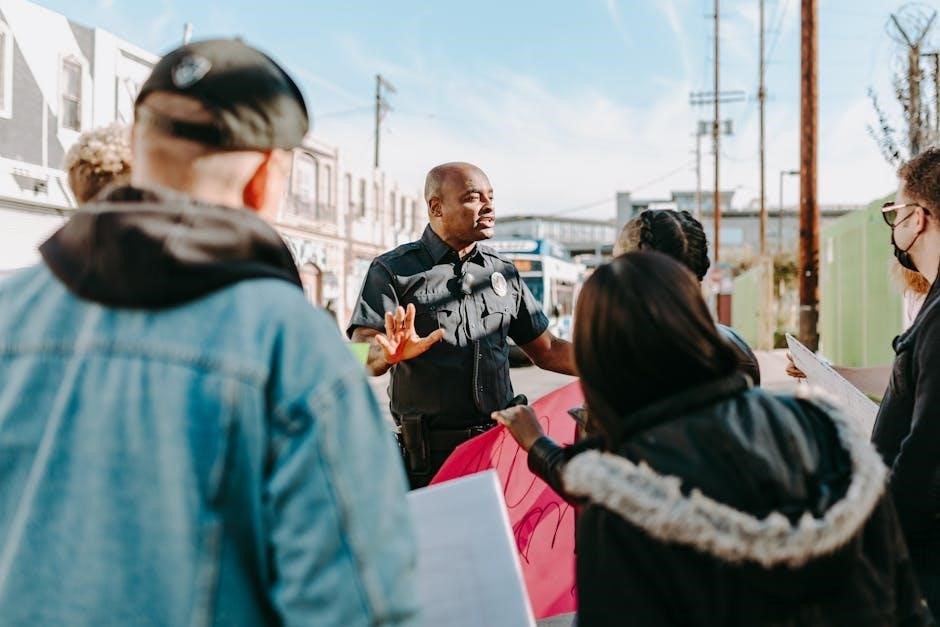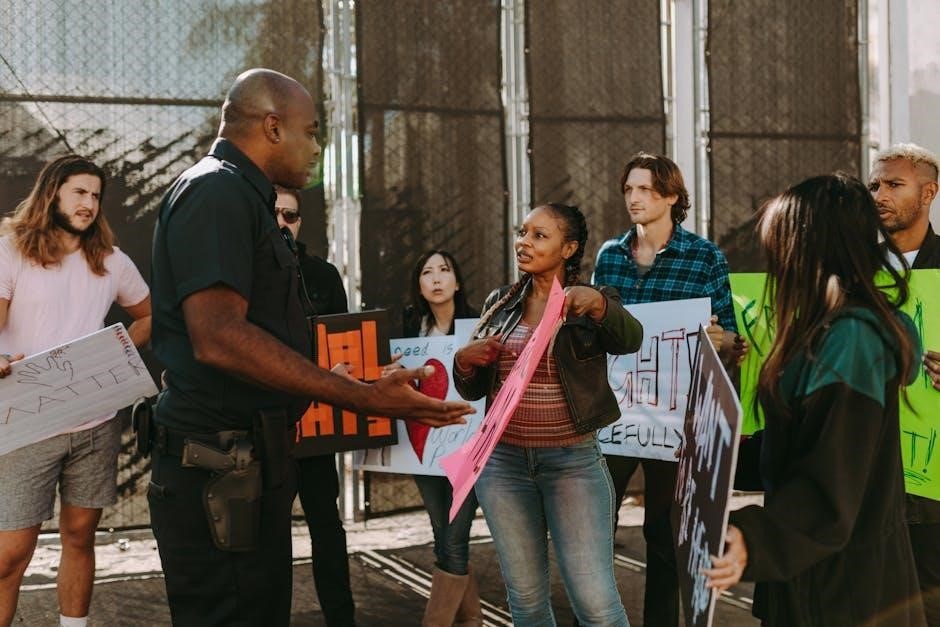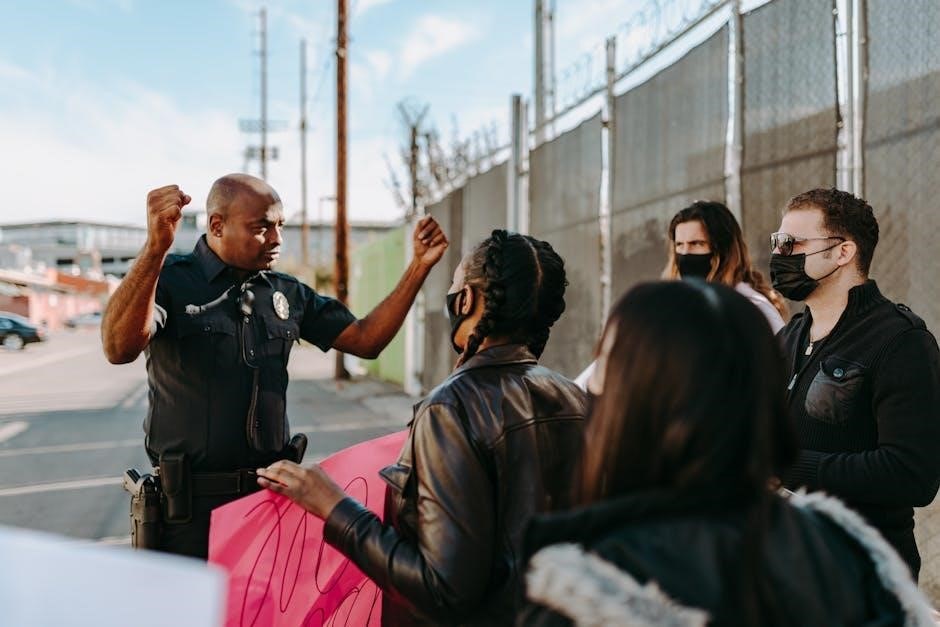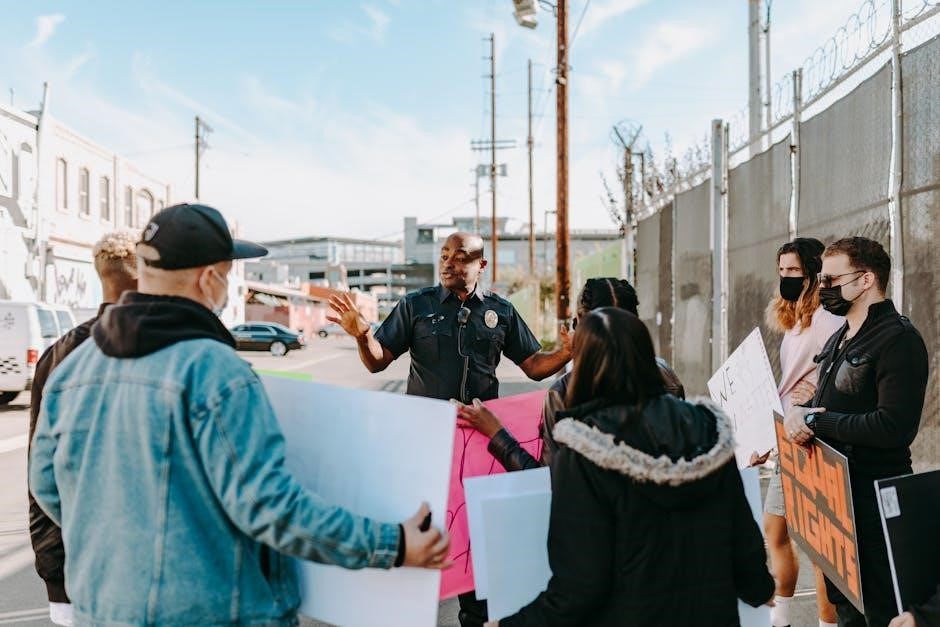
A “Right Within Discussion Guide” is a structured approach to exploring rights, fostering dialogue, and engagement across diverse contexts, emphasizing human rights, civil society legitimacy, and privilege.
Definition and Scope of “Right Within Discussion Guide”
A “Right Within Discussion Guide” is a structured framework designed to facilitate meaningful conversations on rights, fostering dialogue and engagement. It covers human rights, civil society legitimacy, and privilege, providing tools for inclusive discussions. The guide is applicable across educational, community, and organizational settings, enabling participants to explore complex issues through structured dialogue. Its scope includes promoting empathy, understanding, and action, ensuring diverse perspectives are heard and valued in the pursuit of equity and justice.
Importance of Structured Discussions in Understanding Rights
Structured discussions play a pivotal role in fostering deeper understanding of rights by encouraging active engagement and critical thinking. They provide a platform for diverse perspectives, enabling participants to explore complex issues systematically. Such discussions promote empathy, challenge biases, and clarify misconceptions, fostering a more informed and inclusive dialogue. By guiding conversations with clear objectives, structured discussions ensure that all voices are heard, leading to meaningful insights and collective action in advancing rights and social justice.
Key Concepts Related to Rights Within Discussion Guides
Empowering individuals through inclusive dialogue, understanding rights, and addressing privilege are central to fostering engagement and social justice within discussion guides.
Human Rights as a Central Theme in Discussion Guides
Human rights are fundamental moral entitlements inherent to all individuals, shaping discussions on dignity, justice, and equality. They serve as a cornerstone for dialogue, fostering engagement on global issues like freedom, privacy, and non-discrimination. Discussion guides highlight the UN’s role in promoting these rights, emphasizing state responsibilities and individual freedoms. By exploring real-world examples, these tools empower participants to address systemic injustices and advocate for equality, making human rights a vital focus in structured conversations across various contexts.
Civil Society Legitimacy and Its Role in Rights Discussions
Civil society legitimacy is crucial in fostering rights discussions, enabling structured dialogue and collective action. It empowers marginalized voices, ensuring diverse perspectives are heard. By bridging communities and institutions, civil society enhances trust and accountability, creating inclusive environments for dialogue. This legitimacy is vital for addressing systemic inequities and promoting human rights, as seen in global initiatives that leverage discussion guides to engage stakeholders and drive meaningful change.
Privilege and Its Impact on Rights-Based Conversations
Privilege significantly influences rights-based conversations by shaping perspectives and access to resources. Recognizing one’s privilege fosters empathy and understanding, crucial for inclusive dialogue. It highlights systemic inequalities, encouraging participants to acknowledge and address disparities. By addressing privilege, discussions become more equitable, ensuring all voices are valued. This awareness promotes mutual respect and collaboration, enhancing the effectiveness of rights-focused conversations in diverse settings.

The Role of Discussion Guides in Civil Society
Discussion guides foster inclusive dialogue, promote equality, and empower communities through structured conversations on rights, education, and social justice, enhancing collective understanding and driving impactful change.
Fostering Dialogue and Engagement Through Discussion Guides
Discussion guides create inclusive environments for open dialogue, encouraging active listening and empathy. They empower individuals to explore complex rights issues, fostering collaboration and mutual understanding. By addressing privilege and legitimacy, these tools promote equitable participation, ensuring diverse voices are heard. Structured conversations enable deeper reflection on human rights, education, and social justice, while project-based learning and AI-driven questions enhance engagement. These guides bridge divides, inspiring collective action and advocacy for a more just society.
Case Studies of Successful Rights-Based Discussions
Successful rights-based discussions often involve structured dialogue and inclusive participation. For example, human rights discussions facilitated by the UN have led to actionable policies. Similarly, project-based learning initiatives in schools have enabled students to address social justice issues effectively through guided conversations. These case studies highlight how discussion guides foster collaboration, empathy, and understanding, resulting in meaningful outcomes and empowered communities. They demonstrate the transformative power of structured dialogue in advancing rights and fostering social change globally.
Challenges in Facilitating Rights Discussions
Facilitating rights discussions can be complex due to cultural differences, power imbalances, and varying levels of privilege. Participants may hold deeply personal beliefs, making it difficult to create a neutral space. Additionally, ensuring inclusivity and equal participation is a common challenge. Misinformation and emotional sensitivities can derail conversations, requiring skilled moderation. These obstacles highlight the need for well-prepared discussion guides and trained facilitators to navigate such complexities and foster constructive dialogue effectively.

Educational Applications of Rights Discussion Guides
Rights discussion guides are valuable educational tools, fostering critical thinking and dialogue on human rights issues. They engage students in project-based learning, promoting real-world application of rights concepts.
Integrating Rights Discussions Into Educational Curricula
Integrating rights discussions into educational curricula enhances critical thinking and empathy. By incorporating structured guides, students engage with human rights issues through interactive dialogue and project-based learning. These tools align with educational standards, fostering a deeper understanding of global and local rights challenges. They also provide educators with resources to create inclusive environments, encouraging students to explore real-world applications of rights concepts. This approach prepares learners to address complex societal issues thoughtfully and collaboratively.
Project-Based Learning Through Dialogue
Project-based learning through dialogue engages students in meaningful discussions, fostering critical thinking and collaboration. Discussion guides provide structured frameworks for exploring rights-based topics, enabling learners to design and lead conversations. This approach encourages students to apply theoretical concepts to real-world issues, promoting deeper understanding and active participation. By integrating dialogue into project-based learning, educators create dynamic environments where students can articulate their perspectives and develop essential communication skills while addressing complex rights-related challenges collaboratively.
Assessing the Outcomes of Rights-Focused Discussions
Assessing the outcomes of rights-focused discussions involves evaluating participation, critical thinking, and understanding of key concepts. Feedback surveys, reflection exercises, and dialogue assessments can measure engagement and knowledge retention. Instructors use rubrics to gauge how well students articulate their perspectives and address rights-based issues. Technology, such as AI tools, can also track discussion dynamics, ensuring inclusive and meaningful interactions. These methods help determine the effectiveness of the discussion guide in fostering awareness and empathy, while identifying areas for improvement in future discussions.

Human Rights as a Specific Focus in Discussion Guides
Human rights are central to discussion guides, emphasizing moral entitlements, UN roles, and balancing state responsibilities with individual freedoms, while highlighting global rights examples and advocacy.
The UN’s Role in Shaping Human Rights Discussions
The United Nations plays a pivotal role in shaping human rights discussions through its declarations and initiatives, providing a global framework for dialogue on moral entitlements and freedoms. By setting universal standards, the UN ensures that discussions remain inclusive and aligned with international principles. Its efforts in promoting equality and justice have made it a cornerstone for guiding conversations on human rights worldwide, fostering accountability and collaboration.
State Responsibilities vs. Individual Freedoms
Balancing state responsibilities with individual freedoms is a cornerstone of rights discussions. States must provide infrastructure, security, and equality, while individuals retain rights like free speech and privacy. Ethical dilemmas arise when states prioritize security over rights, questioning their moral legitimacy. This tension highlights the need for clear frameworks to ensure both duties and freedoms are upheld, fostering a just and equitable society. The balance between collective welfare and personal autonomy remains central to rights-based conversations.
Examples of Rights Discussions in Global Contexts
Global rights discussions often highlight diverse perspectives, such as the UN’s role in shaping human rights dialogues. In the Middle East, freedom of expression is frequently debated, while in Europe, privacy rights vs. surveillance are key topics. In Asia, labor rights and gender equality dominate conversations. Africa focuses on land rights and women’s empowerment, while the Americas address racial justice and LGBTQ+ rights. These examples illustrate how discussion guides foster dialogue, promoting equality and justice across cultures and regions.
Facilitating Effective Discussions on Rights
Effective discussions on rights require preparation, inclusivity, and structured tools to ensure active listening and respect. This fosters productive dialogue aligned with global human rights frameworks.
Preparation Strategies for Rights Discussions

Effective preparation involves setting clear objectives, establishing ground rules, and providing relevant materials. Discussion guides, vocabulary aids, and AI tools can enhance engagement. Creating an inclusive environment ensures respectful dialogue, fostering active listening and diverse perspectives. Preparing thought-provoking questions and case studies encourages critical thinking. Cultural sensitivity and awareness of power dynamics are crucial. Aligning discussions with global human rights frameworks ensures relevance and depth, making conversations meaningful and impactful for all participants involved.
Creating an Inclusive Environment for Dialogue
Creating an inclusive environment requires fostering respect, empathy, and safety for all participants. Ground rules should promote active listening and discourage interruptions. Encouraging diverse perspectives ensures voices from all backgrounds are heard. Facilitators should address power imbalances and privilege, fostering a space where everyone feels valued. Cultural sensitivity and awareness are key to bridging differences. By prioritizing inclusion, discussions become more meaningful, fostering deeper understanding and collaboration among participants.
Tools and Resources for Rights Discussions
Effective rights discussions rely on tailored tools and resources. Discussion guides, case studies, and AI-driven question generators facilitate meaningful conversations. Educational materials, such as vocabulary guides, enhance comprehension. Digital platforms offer interactive exercises, while project-based learning encourages deeper engagement. These tools empower facilitators to create structured, inclusive environments, ensuring diverse perspectives are explored. By leveraging these resources, discussions become more impactful, fostering understanding and action on critical rights issues.
Current Trends and Future Directions
AI tools now craft questions to promote discussions on rights, fostering cultural sensitivity and youth engagement, while ensuring inclusive and impactful conversations about human rights globally.
The Impact of AI and Technology on Rights Discussions
AI tools are revolutionizing rights discussions by crafting thoughtful questions that promote engagement on topics like women’s rights and empowerment. Technology enhances inclusivity and cultural sensitivity, enabling diverse voices to be heard. Digital platforms provide accessible resources and foster global participation, especially among youth. These innovations ensure discussions are informed, respectful, and impactful, while maintaining ethical considerations to avoid bias and misinformation.
Cultural Sensitivity in Rights Discussions
Cultural sensitivity is crucial in rights discussions to ensure inclusivity and respect for diverse perspectives. It involves understanding varied traditions, values, and identities to foster meaningful dialogue. By acknowledging cultural differences, participants can address rights issues without imposing biases, creating a safe space for open exchange. This approach promotes empathy and collaboration, enriching discussions and fostering mutual understanding across cultures. It ensures that all voices are valued, leading to more equitable outcomes.
Engaging Youth in Rights Discussions
Engaging youth in rights discussions is vital for fostering awareness and active citizenship. Young people bring fresh perspectives and energy to conversations about human rights and social justice. Discussion guides tailored to their interests, such as project-based learning and interactive activities, can deepen their understanding. By involving youth in dialogue, society equips them with critical thinking skills and empowers them to advocate for change, ensuring a brighter future for all. Their participation is key to sustaining progress in rights-based initiatives.
The “Right Within Discussion Guide” effectively fosters dialogue and engagement, empowering individuals to navigate complex rights issues thoughtfully and inspiring collective action for a just future.
Summarizing the Key Takeaways
The “Right Within Discussion Guide” emphasizes the importance of structured dialogue in understanding rights, highlighting human dignity and civil society’s role in fostering engagement. It underscores the need for legitimacy, inclusivity, and cultural sensitivity in discussions. Educators and facilitators play a crucial role in integrating rights-focused dialogues into curricula and projects. By promoting meaningful conversations, the guide empowers individuals to address complex issues like privilege and freedom, inspiring collective action for a more equitable future.
The Way Forward for Rights Discussions
The future of rights discussions lies in leveraging technology and fostering inclusivity. AI tools can enhance dialogue by crafting thought-provoking questions, while engaging youth ensures intergenerational collaboration. Cultural sensitivity must remain central to these conversations, respecting diverse perspectives; By integrating rights discussions into education and civil society, we can build a more equitable world. Continuous innovation and adaptation will be key to sustaining meaningful dialogue and driving positive change globally.




